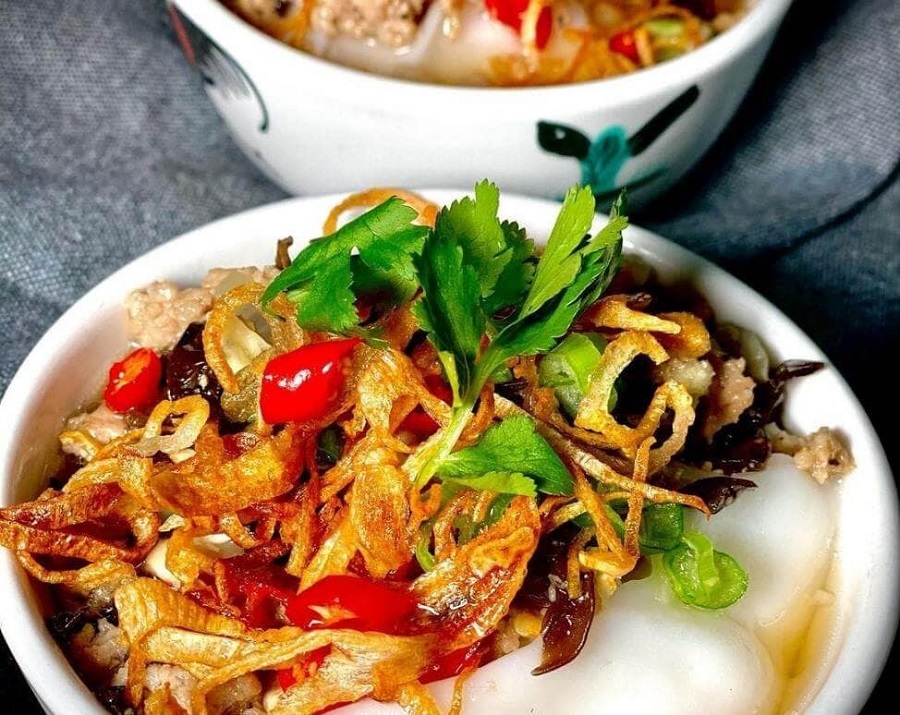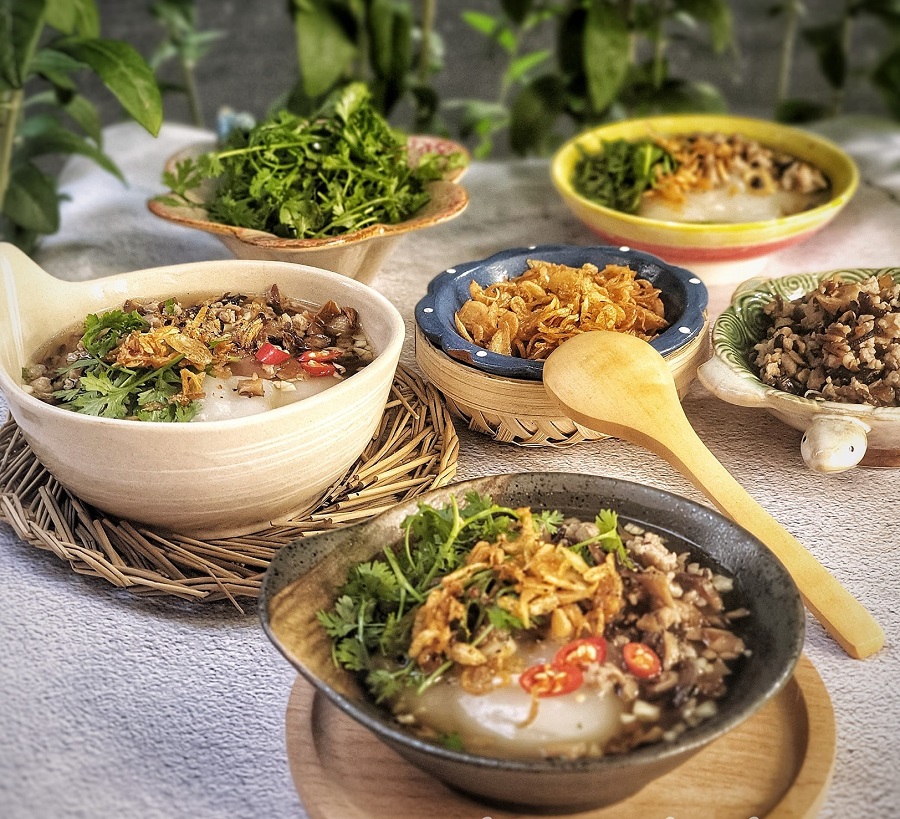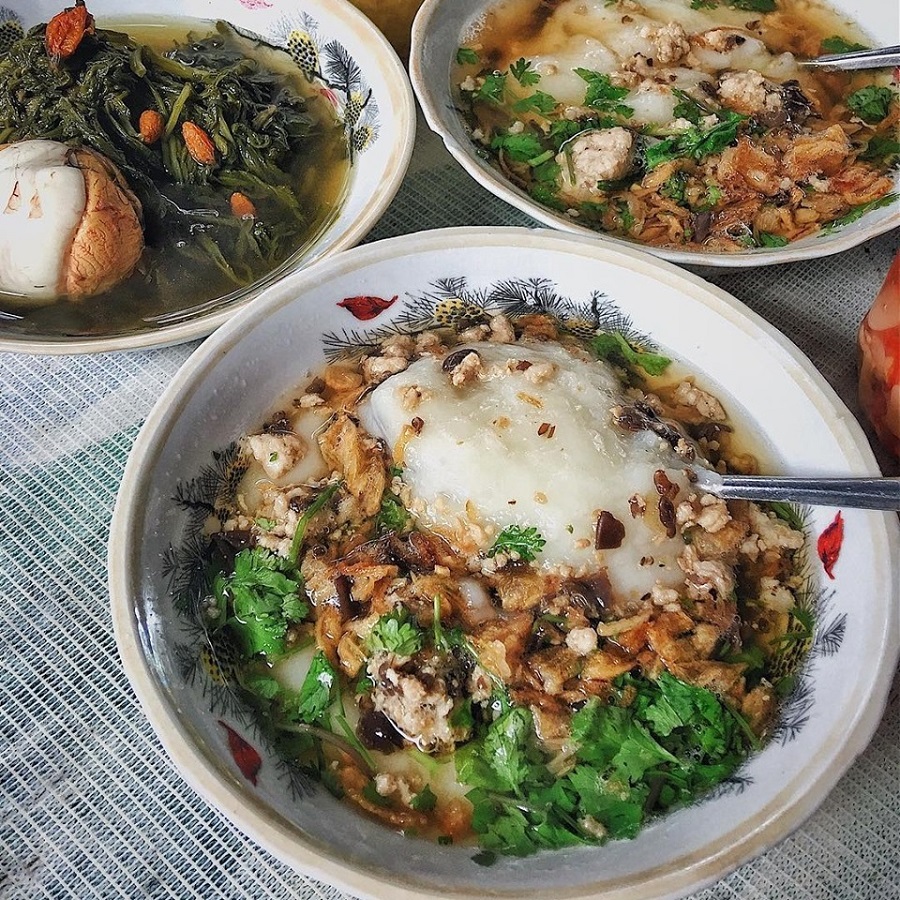Hot Banh duc for Hanoi's winter days
The soft, heartwarming cake, served with sweet and sour fish sauce, is a familiar afternoon dish among the citizens when the weather turns cold.
Despite a wealth of Hanoi light snacks, hot Banh duc (cake made of rice flour and lime water) still holds an irreplaceable position on the locals’ list of choices.
| The rustic specialty of Hanoi - hot Banh duc with minced pork, wood ear mushroom, dried onion and herbs. Photo: Viet Hai |
Banh duc is a rustic dish that has existed for a long time in the cuisine of Northern Vietnam. In the olden days, among impoverished families suffering from rice shortages, Banh duc was seen as the heartiest part of a meal, usually without garnish.
Wonderful treat in Hanoi winter
The thick traditional flan is made of rice flour stirred in clear limewater, kept cool after boiling, then cut into blocks. When eaten, the chewy flan texture blends with the scent of peanuts scattered inside and the strong taste of Tuong Ban (fermented soybean dipping paste from Ban Yen Nhan Ward in Hung Yen Province).
Nowadays, Banh duc has become a great snack thanks to creative recipes. Hot Banh duc was born at an unknown time, adding another specialty to Hanoian street food.
The new generation of Banh duc is strikingly different from the original: it includes a lot more ingredients, and it doesn’t give diners a cool sensation. On the contrary, people usually have this dish when they crave a warm, savory snack that isn't so watery as congee.
Unlike the traditional flan, which is thick and smooth after cooling, hot Banh duc is gelatinous and will flow down when you scoop it up. As the main ingredient that makes up the soul of the dish, the dough varies from maker to maker according to their secret recipes.
Recipe secrets
| Hanoian talented housewives could also prepare the dish at home. Photo: Phuong Cherry |
Typically, in cooking hot Banh duc, the maker will mix two types of flour, non-glutinous rice flour, and tapioca flour, in a particular ratio. The mixture is then sifted to filter out clumps. This step is small yet not to be forgotten because thoroughly sifted flour contributes to making the dough supple after being stirred in lime water without the pungent smell of dry flour.
The most challenging part has just been mentioned: stirring the dough, which must be handled by skilled hands familiar with the steady circular motion. A standard pot of Banh duc will have the fragrance of new rice, with the cake not lumpy or burnt.
The hot Banh duc shop on Le Ngoc Han Street has been around for nearly 40 years. According to the owner, when the dish was first introduced, many people hesitated to try the strange cake - despite its largely familiar name - served with sweet and sour fish sauce and minced pork stir-fried with wood ear mushroom.
However, that ‘innovative’ snack, thought to be ignored in no time, tasted wonderful - even in an addictive way!
Lovely flavor
| Hanoian father and son enjoy the hot Banh duc. Photo: Van Anh |
Each serving of hot Banh duc here contains a ladle of minced pork stir-fried with wood ears. The pork is lean with few or no fatty bits, giving off an aromatic smell. Scattered wood ear shreds are crunchy and harmoniously blended with the smoothness of the cake.
Hot sweet and sour fish sauce are also poured into the bowl to a near-full level, and coriander is sprinkled on top. When you eat the cake, your taste buds feel like reeling in ecstasy as the aromatic stir-fry mixes with the fish sauce, forming a naturally sweet taste.
Many people are worried that the fish sauce will make the dish too sour, but the creator of hot Banh duc cleverly added stir-fried minced pork to give it a lovely flavor. Those who want to exclude meat for fear of stomach heaviness can enjoy the cake with golden fried tofu, which is equally well-suited. Little fragrant, crispy fried onions added will make the dish even more unforgettable.
In addition to hot Banh duc, there is also Banh duc salad - julienne Banh duc mixed with basil, rice paddy herbs, beefsteak plant, roast peanuts and sesame seeds, as well as partly cooked mung bean sprouts in a refreshing dipping sauce.
| The wonderful hot Banh duc is one of the must-try dishes in Hanoi during the winter. Photo: Chuyen cua Ha Noi |
There is an old saying among Hanoians: “Banh gio (pyramidal rice dumpling) is a snack that leaves you hungry, while Banh duc is one that makes you stuffed.”
Yet today’s hot Banh Duc is truly a snack, not for filling an empty stomach. It is a dainty, Hanoian-style version of traditional Banh duc: a snack for winter afternoons when people crave something for their bored mouths, which is not too heavy but just enough to fill their stomachs warm their bodies.
Currently, there are numerous popular shops around Hanoi selling hot Banh duc, such as those at 14C Hang Than Street in Ba Dinh District, 8B Le Ngoc Han Street in Hai Ba Trung District or 28 Hang Be Street in Hoan Kiem District. No matter your choice, you are strongly recommended to taste the specialty if you visit the capital this winter.















